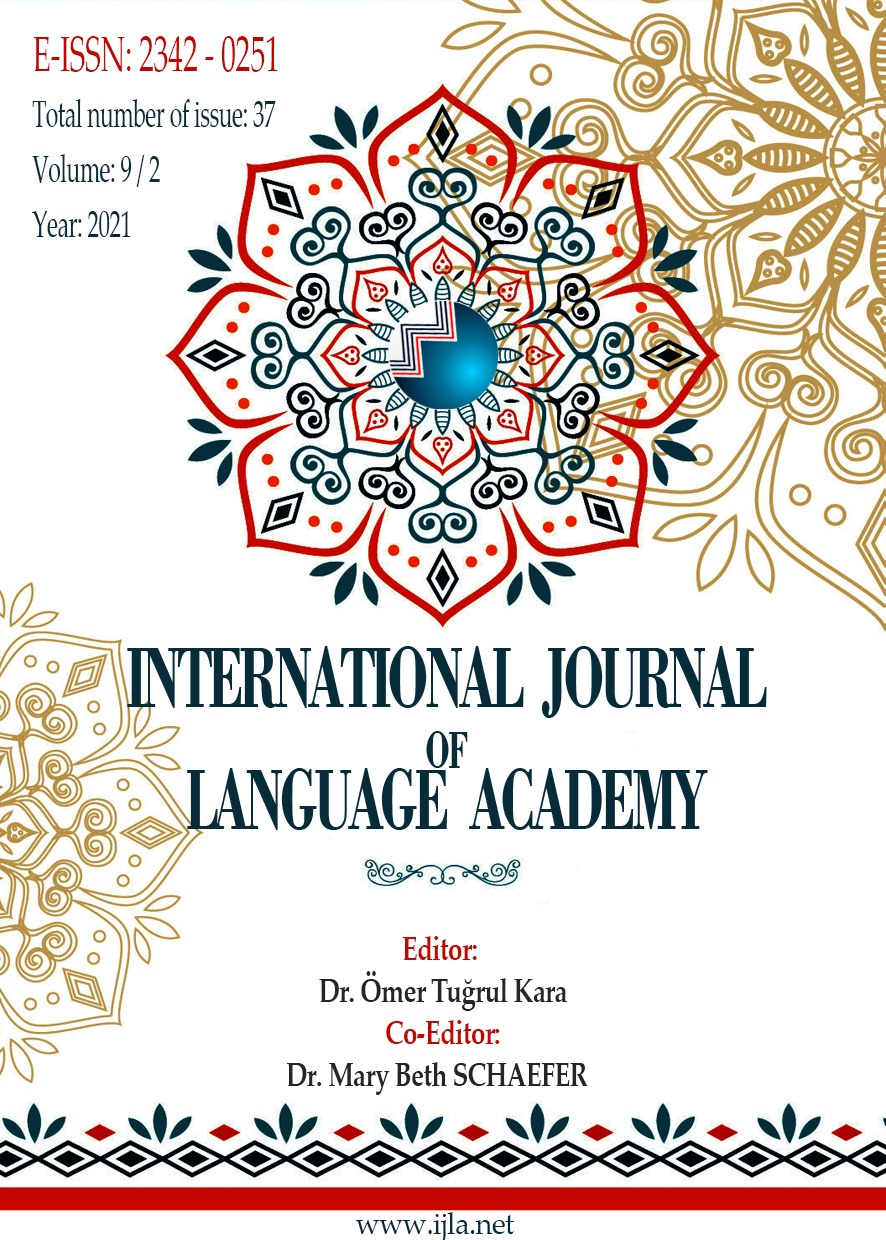Author :
Abstract
Toplumu oluşturan ve onun önemli bir parçası olan insan, içinde yaşadığı toplumun değerleri ile bütünlük kazanır, toplumsallaşma sürecini toplum içinde tamamlar. Doğum, evlenme ve ölüm insan yaşamının önemli üç geçiş dönemini oluşturmaktadır. Bu üç geçiş döneminin sonuncusu olan ölüm ve ritüelleri etrafında birçok adet, inanç, gelenek ve kültürel yapı oluşmuştur. Geçmişten günümüze zengin bir geleneğe sahip ölüm ve cenaze ile ilgili bütün inanış ve uygulamalarda ölümün her şeyin sonu olmadığı, sadece bu dünyadan bir göç olduğu bilinciyle hareket edilmiştir. Bu dünyadan göçen hatun veya er kişi için inanış ve töre dâhilindeki bütün uygulamalarda her türlü hassasiyet gösterilmiş ve ölenin ruhunun incinmemesi adına adeta onun şanına yaraşır bir uğurlama töreni tertip edilmeye gayret gösterilmiştir. Türk halk kültüründe toplumsal yapıyı oluşturan, düzenleyen birçok toplantı ve tören bulunmaktadır. Düzenlenen törenler, dini ve din dışı olmak üzere iki temel anlayışın kaynaşmasıyla oluşmuştur. Bu törenler sosyal, toplumsal, dini, iktisadi birçok konuyu kapsayan işlevlere sahiptir. Bu işlevlerden biri de toplumsal birleşmeyi ve paylaşmayı sağlayan tarihi seyri içinde değişikliklere uğrayan cenaze merasimleridir. Bu çalışmada Bulgaristan Şumnu (Shumen) ilinde yaşayan Türklerin halk kültürünün bir parçası olan cenaze merasimi geleneğine değinmek amacıyla saha çalışması yapılarak derlenen malzemeyle bölgedeki Türkler arasında yaşayan ve yaşatılmaya çalışılan cenaze merasimi tespit edilmiş ve ortaya konulmuştur. Araştırma sonunda, ölüm ötesi dünyayı algılama ve anlamlandırma bağlamında Şumnu’da yaşayan Türklerin cenaze merasimlerinde temelde dini unsurların içinde kaynaşmış, eski Türklere ait ritüellerin varlığının görüldüğü sonucuna ulaşılmıştır.
Keywords
Abstract
The human being, who forms the society and is an important part of it, gains integrity with the values of the society in which they live and complete the socialization process within the society. Birth, marriage and death constitute three important transitional periods of human life. Many customs, beliefs, traditions and cultural structures have been formed around death and its rituals, the last of these three transition periods. In all beliefs and practices related to death and funeral, which have a rich tradition from the past to the present, it has been acted with the awareness that death is not the end of everything, but it is only an immigration from this world. All kinds of sensitivity have been shown in all practices within the belief and custom for the girl or individual who migrated from this world, and efforts have been made to organize a farewell ceremony that is almost worthy of her glory in order not to hurt the soul of the deceased. There are many meetings and ceremonies that form and organize the social structure in Turkish folk culture. The ceremonies held were formed by the fusion of two basic concepts, religious and non-religious. In this study, in order to touch on the tradition of the funeral ceremony, which is a part of the folk culture of the Turks living in the Bulgarian province of Shumen, the material compiled by field work was determined and the funeral ceremony lived and tried to be kept alive among the Turks in the region was determined and revealed. At the end of the research, in the funeral ceremonies of Turks living in Shumen in the context of perceiving and understanding the world beyond death; basically, it was concluded that religious elements were fused in, and the existence of rituals belonging to the ancient Turks was observed.
Keywords
- Boratav, P. N. (2015). Yüz soruda Türk folkloru, Ankara: Bilgesu Yayınları.
- Eliade, M. (2003). Dinler tarihine giriş (L. Arslan, Çev.). İstanbul: Kabalcı Yayınevi.
- Eröz, M. (1992). Eski Türk dini (gök tanrı inancı) ve Alevîlik Bektaşîlik. İstanbul:Türk Dünyası Araştırmaları Vakfı Yayınları.
- Ertürk, S. A.(2013). Şumnu şehri, İstanbul, İstanbul Üniversitesi Edebiyat Fakültesi (Süha Göney’e armağan). İstanbul Üniversitesi Edebiyat Fakültesi Yayınları.
- İnan, A. (1992). Manas Destanı. İstanbul: Milli Eğitim Bakanlığı Yayınları.
- İnan, A. (2002). “Orun” ve “ülüş” meselesi, Türkler. Ankara: Yeni Türkiye Yayınları.
- Kaderli, Z. (2004). Deliorman (Bulgaristan) Türk sözel kültüründe geçiş törenleri. Yayımlanmamış Yüksek Lisans Tezi. Hacettepe Üniversitesi Sosyal Bilimler Enstitüsü. Ankara.
- Kalaycı D., Durdu, B. (1998). “Geçmişten günümüze ölüm adetleri ve Kemaliye köyünde ölüm”. Türk Halk Kültürü Araştırmaları. Ankara: Kültür Bakanlığı HAGEM Yayınları.
- Koca, S. (2000). Türk kültürünün temelleri II. Trabzon: Karadeniz Teknik Üniversitesi Giresun Fen Edebiyat Fakültesi Yayınları.
- Köksal, O. (2006). XIX. Yüzyılda bir Osmanlı ordugâh kasabası Şumnu. İstanbul: Araştırma
- Ögel, B. (2001). Dünden bugüne Türk kültürünün gelişme çağları. İstanbul: Türk Dünyası Araştırmaları Vakfı Yayınları.
- Ölmez, Ö. (2008). Türk Folklorunda ölüm üzerine sosyolojik bir çalışma: Yayımlanmamış Yüksek Lisans Tezi, Sakarya Üniversitesi. Sakarya.
- Örnek, S. V. (1979). Anadolu folklorunda ölüm. Ankara: Kültür Bakanlığı Yayınları.
- Örnek, S. V. (2000). Türk halkbilimi. Ankara: Kültür Bakanlığı HAGEM Yayınları.
- Türkmen, F. (1995). Manas Destanı ve Anadolu’daki bazı adet ve inanmalarla ilişkisi. Ankara: Atatürk Kültür, Dil ve Tarih Yüksek Kurumu.
